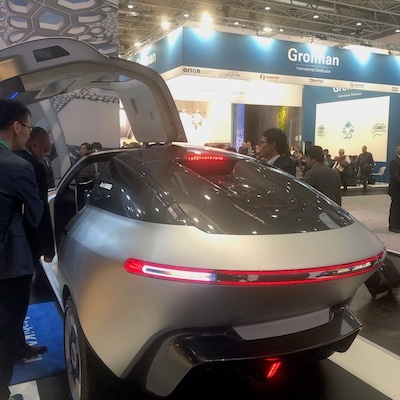The Akxy electric concept car features materials such as semi-aromatic glass-filled polyamide, mPPE particle foam, and glass-reinforced polypropylene.
October 21, 2019

Japan’s Asahi Kasei has brought numerous engineering plastic and foam material solutions for the automotive industry to K 2019. One highlight at the booth is the drivable Akxy electric concept car (Hall 8a, J15).
|
Asahi Kasei’s Akxy electric concept car showcases many of the company's engineering plastic and foamed plastic solutions for next-generation automobiles. |
Asahi Kasei, the world’s only manufacturer of both homo- and copolymer POM under the brand name Tenac, developed a low-VOC material many years before the automotive industry started in-depth to address this issue. Tenac has the world’s lowest VOC emission class – exceeding the high standards of all OEMs worldwide. Also, properties like low friction, scratch resistance, and high mechanical strength make Tenac a suitable material for applications in the automotive interior.
It is already used in applications like sliders for seat adjustments, lumbar supports for seating comfort, or seat belt push buttons. The company has recently developed a metal-looking low-VOC Tenac, using aluminum flakes as a filler. Looking and feeling like metal, it features a high scratch resistance while at the same time improving the in-car air quality compared to other materials.
When it comes to autonomous vehicles, panoramic roofs allow more light inside and offer excellent views of the surroundings to the passengers. Asahi Kasei’s glass-reinforced polypropylene Thermylene polypropylene (PP) features a high flowability and offers cost advantages compared to polyamide. Lighter and larger sunroof panels made of this material will add to the overall living-space experience of the future automotive.
With more sunlight inside the car, the necessity for UV-resistant materials will grow. Asahi Kasei’s semi-aromatic glass-filled polyamide Leona polyamide (PA) withstands the toughest automotive exterior UV tests – without any additional coating. It is used for exterior mirror brackets – and is now finding its way inside the car. It is already used for the fine thin-walled and unpainted blades of a dashboard venting system, directly positioned under the front windshield and with maximum sunlight exposure.
Sound insulation will become a key factor for the living-space experience inside the car. Ambient noise will need to be kept outside, while loud music should stay inside the car. Based on its expertise as one of only four fully integrated polyamide manufacturers, Asahi Kasei is currently developing the world’s first polyamide bead foam. Featuring the proven properties of polyamide – like high heat and chemical resistance – the special C- or macaroni shape of its beads also enables a significant noise reduction.
Applications for Xyron mPPE are to be found to a large extent in the automotive sector. Thanks to its low density, mPPE (modified polyphenylene ether) is suitable for a wide range of lightweight components, that are used, for example, for relay blocks, hood panels, and brackets. Concerning the current period of upheaval in the automotive sector, Xyron is especially used in the context of structural battery parts in the field of e-mobility. In this regard, the material contributes to a compact and weight-saving battery design, at the same time leading to more efficiency as well as safety.
SunForce mPPE particle foam is a particle foam based on the engineering plastic m-PPE. Compared to standard foams made of polystyrene or polyolefin, the use of m-PPE equips this foamed material with unique properties, opening new doors for applications in thermal management and fire protection. The material is certified with UL 94 V-0 (Standard for Safety of Flammability of Plastic Materials for Parts in Devices and Appliances) fire protection class by the Underwriters Laboratories safety certification organization and thus contributes to overall product safety. SunForce is the first-of-its-kind material certified with the UL94 V-0 standard. In addition to this outstanding flame retardancy, the material provides superior heat insulation properties while at the same time functions as a lightweight shock-absorbing material for automotive battery packs.
About the Author(s)
You May Also Like





